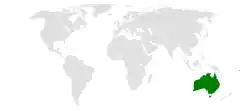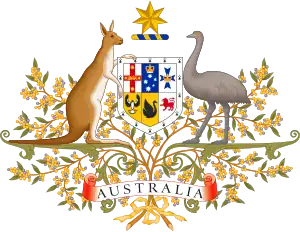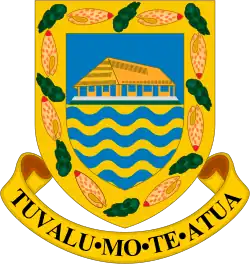 | |
Australia |
Tuvalu |
|---|---|
Diplomatic relations between Australia and Tuvalu were established in 1978, with the independence of Tuvalu, and both countries are members of the Commonwealth of Nations which share a head of state, King Charles III. Australia has had a High Commission in Funafuti since 2018. Tuvalu is not currently represented in Australia at the high commissioner or consular level.
History
Australia has strong ties with Tuvalu and was one of the three founding donating countries to the Tuvalu Trust Fund and continues as a major donor of aid and technical assistance to Tuvalu.[1] The official currency of Tuvalu from 1966 to 1976 was the Australian dollar, which strengthens the economic bonds between the two countries in particular. Since 1976, Tuvalu began issuing its own coinage (see Tuvaluan dollar) but the country continues to use Australian banknotes as official currency, and the value of the Tuvaluan currency is directly tied to the Australian dollar. In this regard, the Tuvaluan dollar is similar to the Faroese króna's relationship to the Danish krone as the Tuvaluan dollar is not an independent currency but has been assigned an ISO 4217 currency code, although it is treated as equivalent to the Australian dollar.
In August 2009, Australia signed a Pacific Partnership for Development between Australia and Tuvalu at the Pacific Islands Forum Leaders held in Cairns, Australia. Australia was (along with New Zealand and the United Kingdom) one of the three founding donating countries to the Tuvalu Trust Fund.
Australia is a major aid donor to Tuvalu.[1] In 1994, even before the Pacific Partnership between the two countries was signed, Australia donated a Pacific-class patrol boat (HMTSS Te Mataili) provided by Australia under the Pacific Patrol Boat Program for use by the Tuvaluan police force for search and rescue missions and maritime surveillance and fishery patrol.[2] Australia has agreed to provide its maintenance until 2024 as well as training for its operation. Australia's Defence Cooperation Program supports Tuvalu's maritime police force with training, fresh water and supplies. On 7 April 2019, Australia donated a Guardian-class patrol boat that was named HMTSS Te Mataili II, and which will be operated by the maritime surveillance unit of the Tuvalu Police Force.[3][4]
The government of Australia responded to the 2011 Tuvalu drought by working with New Zealand to supply temporary desalination plants;[5] Australia also provide water tanks as part of the longer-term solution for the storage of available fresh water.[6]
Tuvaluans can participate in the Australian Pacific Seasonal Worker Program, which allows Pacific Islanders to obtain seasonal employment in the Australian agriculture industry, in particular cotton and cane operations; fishing industry, in particular aquaculture; and with accommodation providers in the tourism industry.[7]
Technical and Vocational Skills Development (TVSD) in Tuvalu is supported by the Australian Pacific Training Coalition (APTC).[8]
Australia–Tuvalu Falepili Union
On 10 November 2023, Tuvalu and Australia signed the Australia–Tuvalu Falepili Union, a bilateral treaty which covered migration, climate change, security arrangements and their bilateral diplomatic relationship.[9][10]
In the Tuvaluan language, Falepili describes the traditional values of good neighbourliness, care and mutual respect.[11] The Treaty addresses climate change and security,[11] with security threats encompassing major natural disasters, health pandemics and traditional security threats.[11] The implementation of the Treaty will involve Australia increasing its contribution to the Tuvalu Trust Fund and the Tuvalu Coastal Adaptation Project.[11] Australia will also provide an pathway for citizens of Tuvalu to migrate to Australia, to enable climate-related mobility for Tuvaluans.[11]
Under the Falepili Union Australia and Tuvalu agreed to resolve any disputes bilaterally and not 'involve any national or international tribunal or court or any other third party for resolution'.[9] Australia agreed to provide permanent residency for up to 280 Tuvaluans a year and provide funds to mitigate the effects of climate change.[9] Australia agreed to assist Tuvalu in the event of 'a major natural disaster', a public health emergency of international concern' or 'military aggression against Tuvalu'.[9] Tuvalu agreed to engage with Australia before 'any partnership, arrangement or engagement with any other State or entity on security and defence-related matters'.[9]
The understanding of security that is applied in the Falepili Union is consistent with the Boe Declaration on Regional Security (2018),[12] which commits Pacific Islands Forum members to commit to core values, including good governance, liberty of the individual, democratic processes and indigenous rights. The Boe Declaration expanded the Biketawa Declaration (2000) to include issues of human security, environmental security, transnational crime, and cybersecurity.[12]
Australian High Commission in Tuvalu

In the 2018 Federal budget, Australia allocated funding to establish a High Commission in Tuvalu, becoming one of only two diplomatic missions in Tuvalu (the other being the Embassy of Taiwan).[13] Prior to the appointment of the first resident high commissioner in October 2018, non-resident accreditation for Tuvalu was held by the Australian High Commission to Fiji (held by the High Commissioner from 1978 to 2014, and the Deputy High Commissioner from 2014 to 2018).
The new High Commission in Tuvalu Road, Vaiaku, Funafuti, was officially opened by Foreign Minister Payne on 7 February 2019.[14][15]
High commissioners
See also
References
- 1 2 "Development assistance in Tuvalu". Australian Department of Foreign Affairs and Trade. April 2019. Retrieved 11 April 2019.
- ↑ "Tuvalu country brief". Australian Department of Foreign Affairs and Trade. Retrieved 9 January 2014.
- ↑
Christopher Pyne (7 April 2019). "Guardian Class Patrol Boat gifted to Tuvalu". Department of Defence. Retrieved 7 April 2019.
Te Mataili II was received by the Prime Minister of Tuvalu, the Right Hon Enele Sosene Sopoaga at a handover ceremony attended by the Minister for Foreign Affairs, Trade, Tourism, Environment and Labour, the Hon Taukelina Finikaso, the Minister for Natural Resources, the Hon Dr Puakena Boreham, and the Commissioner of the Tuvalu Police Service, Commissioner Luka Falefou.
- ↑ Macrae, Alistair (11 October 2011). "Tuvalu in a fight for its life". The Drum – Australian Broadcasting Corporation. Retrieved 12 October 2011.
- ↑ Marles, Richard, Parliamentary Secretary for Pacific Island Affairs (Australia) (12 October 2011). "Climate change poses a Pacific problem". The Punch – News Limited. Archived from the original on 13 October 2011. Retrieved 12 October 2011.
{{cite web}}: CS1 maint: multiple names: authors list (link) - ↑ "Seasonal Worker Programme". Department of Employment (Australia). 2017. Archived from the original on 15 August 2012. Retrieved 13 October 2017.
- ↑ "How TVET Change Happens: Tuvalu Stakeholder Perspectives" (PDF). Australian Pacific Training Coalition (APTC). November 2019. Retrieved 10 January 2021.
- 1 2 3 4 5 "Australia-Tuvalu Falepili Union treaty". Australian Department of Foreign Affairs and Trade. Retrieved 12 November 2023.
- ↑ Daniel Hurst and Josh Butler. "Australia to offer residency to Tuvalu citizens displaced by climate change". The Guardian Australia. Retrieved 12 November 2023.
- 1 2 3 4 5 "Joint Statement on the Falepili Union between Tuvalu and Australia". Department of the Prime Minister and Cabinet. 10 November 2023. Retrieved 13 November 2023.
- 1 2 "Boe Declaration on Regional Security". Pacific Islands Forum Secretariat. 5 September 2018. Retrieved 13 November 2023.
- ↑ Murray, Lisa (9 May 2018). "Federal budget 2018: Australia sets up a diplomatic post in Tuvalu". Australian Financial Review. Retrieved 30 December 2018.
- ↑ Payne, Marise (7 February 2019). "Opening of Australian High Commission in Tuvalu" (Press release). Australian Government.
- ↑ "Australian High Commission -Tuvalu". Australian Department of Foreign Affairs and Trade. Retrieved 6 January 2021.

